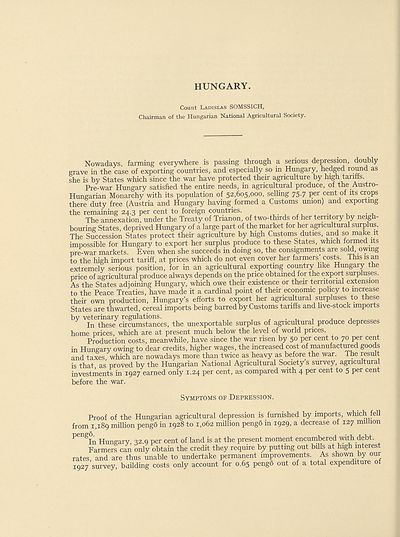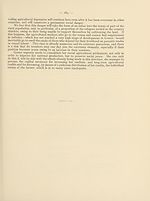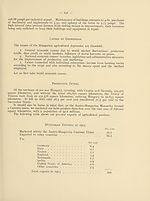Download files
Complete book:
Individual page:
Thumbnail gallery: Grid view | List view

HUNGARY.
Count Ladislas SOMSSICH,
Chairman of the Hungarian National Agricultural Society.
Nowadays, farming everywhere is passing through a serious depression, doubly
grave in the case of exporting countries, and especially so in Hungary, hedged round as
she is by States which since the war have protected their agriculture by high tariffs
Pre-war Hungary satisfied the entire needs, in agricultural produce, of the Austro-
Hungarian Monarchy with its population of 52,605,000, selling 75.7 per cent of its crops
there duty free (Austria and Hungary having formed a Customs union) and exporting
the remaining 24.3 per cent to foreign countries.
The annexation, under the Treaty of Trianon, of two-thirds of her territory by neigh¬
bouring States, deprived Hungary of a large part of the market for her agricultural surplus.
The Succession States protect their agriculture by high Customs duties, and so make it
impossible for Hungary to export her surplus produce to these States, which formed its
pre-war markets. Even when she succeeds in doing so, the consignments are soM owing
to the high import tariff, at prices which do not even cover her farmers costs. This is an
extremely serious position, for in an agricultural exporting country like Hungary the
price of agricultural produce always depends on the price obtained for the export surpluses.
As the States adjoining Hungary, which owe their existence or their territorial extension
to the Peace Treaties, have made it a cardinal point of their economic policy to increase
their own production, Hungary’s efforts to export her agricultural surpluses to these
States are thwarted, cereal imports being barred by Customs tariffs and live-stock imports
by veterinary regulations. . ,
In these circumstances, the unexportable surplus of agricultural produce depresses
home prices, which are at present much below the level of world prices.
Production costs, meanwhile, have since the war risen by 50 per cent to 70 per cent
in Hungary owing to dear credits, higher wages, the increased cost of manufactured goods
and taxes which are nowadays more than twice as heavy as before the war. The result
is that as proved by the Hungarian National Agricultural Society’s survey, agricultural
investments in 1927 earned only 1.24 per cent, as compared with 4 per cent to 5 per cent
before the war.
Symptoms of Depression.
Proof of the Hungarian agricultural depression is furnished by imports, which fell
from 1,189 million pengo in 1928 to 1,062 million pengo in 1929, a decrease of 127 million
PengIn Hungary 32.9 per cent of land is at the present moment encumbered with debt.
Farmers can only obtain the credit they require by putting out bills at high interest
rates, and are thus unable to undertake permanent improvements As shown by our
1927 survey, building costs only account for 0.65 pengo out of a total expenditure of
Count Ladislas SOMSSICH,
Chairman of the Hungarian National Agricultural Society.
Nowadays, farming everywhere is passing through a serious depression, doubly
grave in the case of exporting countries, and especially so in Hungary, hedged round as
she is by States which since the war have protected their agriculture by high tariffs
Pre-war Hungary satisfied the entire needs, in agricultural produce, of the Austro-
Hungarian Monarchy with its population of 52,605,000, selling 75.7 per cent of its crops
there duty free (Austria and Hungary having formed a Customs union) and exporting
the remaining 24.3 per cent to foreign countries.
The annexation, under the Treaty of Trianon, of two-thirds of her territory by neigh¬
bouring States, deprived Hungary of a large part of the market for her agricultural surplus.
The Succession States protect their agriculture by high Customs duties, and so make it
impossible for Hungary to export her surplus produce to these States, which formed its
pre-war markets. Even when she succeeds in doing so, the consignments are soM owing
to the high import tariff, at prices which do not even cover her farmers costs. This is an
extremely serious position, for in an agricultural exporting country like Hungary the
price of agricultural produce always depends on the price obtained for the export surpluses.
As the States adjoining Hungary, which owe their existence or their territorial extension
to the Peace Treaties, have made it a cardinal point of their economic policy to increase
their own production, Hungary’s efforts to export her agricultural surpluses to these
States are thwarted, cereal imports being barred by Customs tariffs and live-stock imports
by veterinary regulations. . ,
In these circumstances, the unexportable surplus of agricultural produce depresses
home prices, which are at present much below the level of world prices.
Production costs, meanwhile, have since the war risen by 50 per cent to 70 per cent
in Hungary owing to dear credits, higher wages, the increased cost of manufactured goods
and taxes which are nowadays more than twice as heavy as before the war. The result
is that as proved by the Hungarian National Agricultural Society’s survey, agricultural
investments in 1927 earned only 1.24 per cent, as compared with 4 per cent to 5 per cent
before the war.
Symptoms of Depression.
Proof of the Hungarian agricultural depression is furnished by imports, which fell
from 1,189 million pengo in 1928 to 1,062 million pengo in 1929, a decrease of 127 million
PengIn Hungary 32.9 per cent of land is at the present moment encumbered with debt.
Farmers can only obtain the credit they require by putting out bills at high interest
rates, and are thus unable to undertake permanent improvements As shown by our
1927 survey, building costs only account for 0.65 pengo out of a total expenditure of
Set display mode to:
![]() Universal Viewer |
Universal Viewer | ![]() Mirador |
Large image | Transcription
Mirador |
Large image | Transcription
Images and transcriptions on this page, including medium image downloads, may be used under the Creative Commons Attribution 4.0 International Licence unless otherwise stated. ![]()
| League of Nations > Economic and financial section > Agricultural crisis > Volume 1 > (192) |
|---|
| Permanent URL | https://digital.nls.uk/190905146 |
|---|
| Shelfmark | LN.II.2/2.(35) |
|---|---|
| Attribution and copyright: |
|
| Shelfmark | LN.II.2/2.(35-35) |
|---|---|
| Shelfmark | LN.II |
|---|
| Description | Over 1,200 documents from the non-political organs of the League of Nations that dealt with health, disarmament, economic and financial matters for the duration of the League (1919-1945). Also online are statistical bulletins, essential facts, and an overview of the League by the first Secretary General, Sir Eric Drummond. These items are part of the Official Publications collection at the National Library of Scotland. |
|---|---|
| Additional NLS resources: |
|

